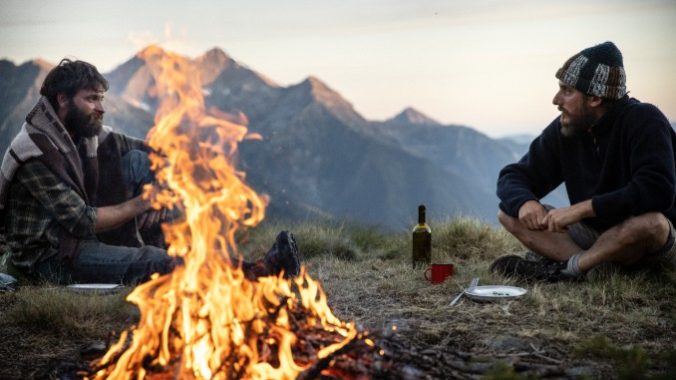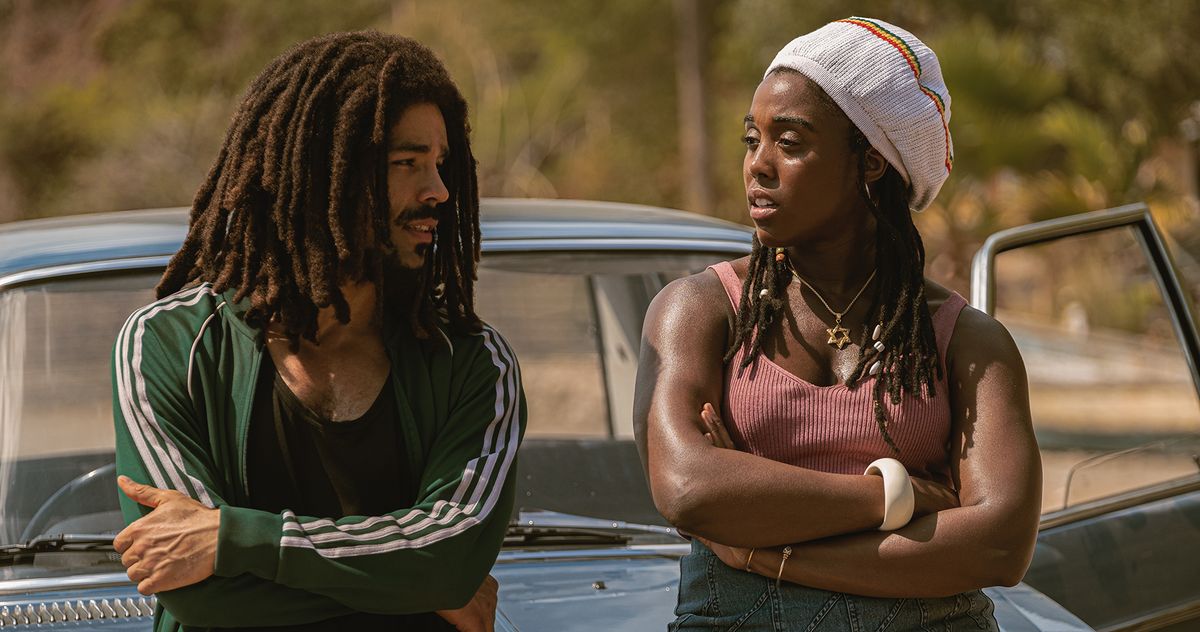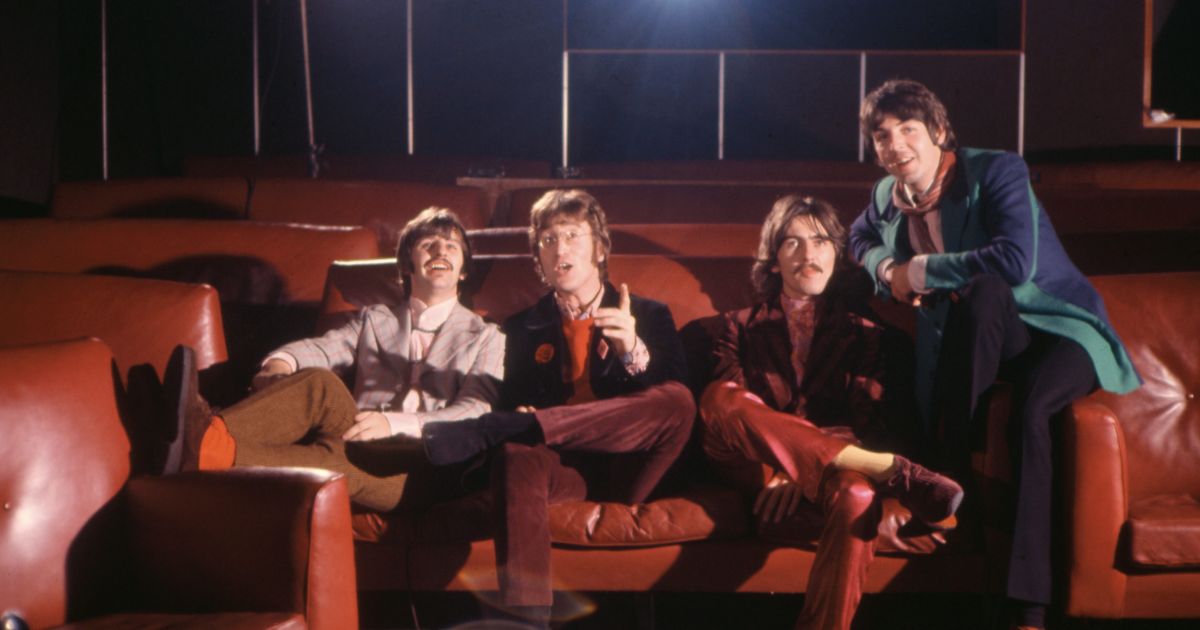
The Eight Mountains Paints a Romantic, Picturesque, Familiar Friendship
A story eternally running through novels (and films based on novels) is the hypothetical question of what would happen if a man had a friend. Supposing also that these men couldn’t really talk openly with one another, and perhaps came from different walks of life, the psychological groundwork is laid once again for a tale about a surface-level relationship that belies deep truths about masculinity and eagle-eyed observations about how we choose to approach our brief time on this world. The Eight Mountains, from Belgian writer-directors Felix van Groeningen and Charlotte Vandermeersch, has a familiar focus, but a self-conscious artistry that draws our attention away. Brilliant landscape photography and two pairs of poignant performances elevate the drama to an enjoyable distance above sea level.
The Eight Mountains hikes the beaten trail of a city boy’s memories, both when he befriended a local kid during his summers in the country town of Grana and when he returned to this retreat (and friendship) as a man. The novelistic premise and presentation (voiceover-heavy and expected, being based on Paolo Cognetti’s book) is sometimes self-important—most notably as its two-and-a-half-hour runtime starts running out of oxygen on the last leg of its journey—but always lush enough that the trip is worth the underwhelming destination. We don’t really care about where the winding road of time takes urban softie Pietro (Lupo Barbiero; Andrea Palma; Luca Marinelli) and blue-collar Bruno (Cristiano Sassella; Francesco Palombelli; Alessandro Borghi), but they’re amiable sight-seeing companions as we follow them from the Alps to the Himalayas.
It’s on these mountain ranges, not in the ponderous dinner conversations, that the film finds its meaning. Its rebellious boys want to strike their own paths, distinct from their fathers, and that only resonates if we see them chafe against the rut they’re set in. In the first and most engaging section—where the preteen boys’ experiences tweak the calibrations of their lives’ trajectories—Pietro’s father (Filippo Timi) takes him and Bruno on a snowy expedition. We follow closely, either in expansive wide shots that track the climbers from an adjacent peak, or as the last in line, our eyeline established by Ruben Impens’ immersive Steadicam. The single-file procession is as beautiful as it is succinctly symbolic.
As a refuge within a refuge, these rural climbs hone in on the film’s observations of contradictory male leisure—of hyper-masculine escapes that shoulder stereotypical implications of solitude and self-reliance, but are, inherently, better when shared. Young Bruno thrives in these conditions, quiet yet capable, while Pietro succumbs to altitude sickness. These are inpidual issues, but the meaning of the trip, why it’s burned into everyone’s memories, is found in the praise or care shown by another. Pietro’s dad tends to both boys, but Pietro feels inadequate and, thus, replaced by a more competent surrogate.
As the film leaps in time (with winning, nonchalant cuts that quicken your heart rate), we learn that Pietro has embraced this self-imposed role as he’s grown up, which encourages the other men to do so in turn. The friends only begin to mend their bond during the course of another one of these familiar masculine contradictions, brimming with meaning: Constructing a home together on the land left after Pietro’s father dies.
Because The Eight Mountains is from Pietro’s perspective, and so specifically about its men, much is left unsaid and unseen. The women, mothers and love interests, are barely there; Bruno’s home life is only alluded to. But this subjectivity is made into a strength by its core cast. Pietro is best when either at his youngest, with Barbiero giving a natural and petulant performance, or oldest, when Marinelli takes over. Marinelli, the charismatic star of the excellent Martin Eden, has the tired eyes and furtive presence of someone searching—the perfect aura for an aimless, wandering lead, tethered only loosely to a friend and a homeland. Borghi, burly and hirsute, projects a comfortable silence without hostility…until he doesn’t—the perfect foil that evolves from Sassella’s simple, youthful groundwork. We see Pietro’s entire arc. Bruno’s is implied. Thanks to the actors’ embodied performances, both are just as obvious and understandable. With a script that can be as heavy as Vandermeersch and van Groeningen’s adaptation, the more implication, the better—especially since everything left up to our discerning eyes to puzzle out is done with nuance.
When Marinelli’s narration can be tuned out, or when the filmmakers embrace one of their lovely montages (soundtracked by accordion and piano tracks from Swedish singer-songwriter Daniel Norgren, interrupting the film’s Italian with jarring English), The Eight Mountains’ imagery thrives. Glimpses of a childhood best spent goofing around in fields and abandoned houses, with flashlights in bunk beds, shine through the gloom of a city’s suffocating traffic and classrooms. Friends, laughing by the light of a campfire, dribble grappa into their beards without a care. Two evergreens, adjacent in the crisp blue air, grow tall together, though they never quite touch.
Impens’ disciplined camera grants these moments the heft they deserve, using a flurry of angles and framings to add romanticism to composition after composition. The ranges don’t need to be in sight for you to understand the wonder luring these men back. Pietro follows his father’s ghost back to the country and to the boy that once displaced him; Bruno remains out of loyalty, both to family and to the land itself. Their unbroken relationship brushes against trenchant comparisons of how we can shift as we age, touching on the easiest paths taken by those in different classes—why more conservative traditionalism can speak to some while a yearning liberalism can coax others—but is best when it sticks to the specific pair in front of us. Confronting the ambitions and worldviews of its central duo, interrogating the city boy’s reductive idea that the country bumpkin has the easy life all figured out, works well, and is summed by the elegant metaphor from which the film draws its title.
In this life, we can either go broad, climbing all the mountains and sailing all the seas of this world, or go deep, investing ourselves in specificity. It’s a matter that not everyone has a choice in, but a matter where the choices are mutually exclusive even for the most privileged. The Eight Mountains succeeds at painting us expansive visions of each, while reminding us that even the most similar trailheads and intersecting paths are unique. As is the thought that a man could be friends with another man, this isn’t a groundbreaking or even always that compelling observation. And yet, it’s easy to stare and ruminate, your own thoughts drawn inward as if you’d found a gallery that’s simplicity allowed you to project yourself onto the canvases. Like revisiting a beautiful vista, The Eight Mountains isn’t going to wow you, but with a step or two backwards, you might just understand why its subject matter keeps attracting artists of this caliber.
Director: Felix van Groeningen, Charlotte VandermeerschWriter: Felix van Groeningen, Charlotte VandermeerschStarring: Luca Marinelli, Alessandro Borghi, Filippo Timi, Elena Lietti, Elisabetta MazzulloRelease Date: May 19, 2023
Jacob Oller is Movies Editor at Paste Magazine. You can follow him on Twitter at @jacoboller.
For all the latest movie news, reviews, lists and features, follow @PasteMovies.


































































